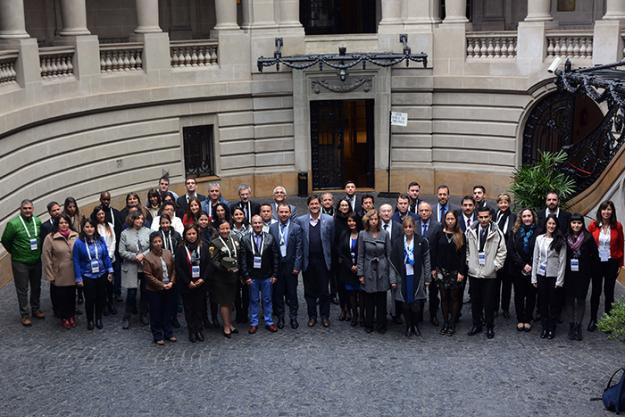
Chemistry professionals at a training on safety and security in chemical laboratories in Buenos Aires, Argentina
THE HAGUE, the Netherlands —25 July 2018— Chemistry professionals from Latin America and the Caribbean enhanced their understandings of safety and security in chemical laboratories, during a course held from 16 – 20 July in Buenos Aires, Argentina.
Executive Secretary of Argentina’s National Authority for the Chemical Weapons Convention (CWC), Ms Mariela Fogante, stated in her opening remarks that, “Argentina considers science and technology in general, and chemical activity in particular, as strategic areas for national development and actively promotes them.” She added that, “the purpose of this course is to share with our colleagues in Latin America and the Caribbean the experience and training of Argentine experts in laboratory management”.
OPCW’s Senior Programme Officer, Mr Sergey Zinoviev, expressed hope that the benefits of this course would be reflected in the adoption of the good safety and security culture in the chemical laboratories of the relevant OPCW Member States. “Improving awareness and sharing best practices among stakeholders is one of the priority areas in the work of the OPCW, as the disarmament is closing to an end and major efforts are needed to prevent re-emergence of chemical weapons and to mitigate risks related to the harm caused by chemicals,” he underlined.
During the training, participants examined various policy and practical aspects of the management of chemical lab infrastructure. Particular emphasis was placed on waste management, personal protection measures, emergency management, toxicology regulations, management of toxic chemicals, and the Global Harmonized System (GHS).
The event included 18 participants from Belize, Bolivia, Chile, Colombia, Costa Rica, Cuba, Guatemala, Mexico, Panama, Paraguay, Peru, and Venezuela, and a number of local participants. Each participant was a professional chemist specialised in occupational safety in public and private sector labs attached to such institutions as customs, police, relief agencies, chemical industry and the academia.
The course was jointly run by the Organisation for the Prohibition of Chemical Weapons (OPCW), the Instituto Nacional de Tecnología Industrial (INTI), and the Argentinian Government.
Background
As the implementing body for the Chemical Weapons Convention, the OPCW, with its 193 Member States, oversees the global endeavour to permanently eliminate chemical weapons. Since the Convention’s entry into force in 1997, it is the most successful disarmament treaty eliminating an entire class of weapons of mass destruction.
Over 96 per cent of all chemical weapon stockpiles declared by possessor States have been destroyed under OPCW verification. For its extensive efforts in eliminating chemical weapons, the OPCW received the 2013 Nobel Prize for Peace.
